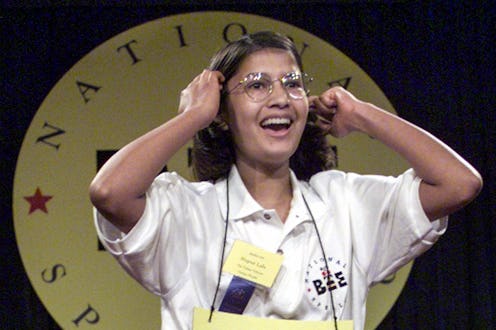News
I'm A Spelling Bee Champion — Here's Why The Competition Is More Important Than Ever

Every year towards the end of May, I’m reminded that it’s “spelling bee time.” Whether it’s my nostalgia for the blueberry pie at the speller barbecue or reliving the rush of correctly spelling “logorrhea” to win the 1999 championship, participating in the Scripps National Spelling Bee stands out to me as a life-altering experience. Regardless of who wins, I believe that a major draw of the event is watching true meritocracy — and diversity — displayed.
Almost 20 years later, one of the biggest attractions of the bee for me is the unusual range of experience and backgrounds represented each and every year. When I started competing in 1998, I pored over the biographies of the previous top finishers in the preparation guide. I saw that spellers grew up in so many different places — from small Midwestern towns, to Navajo reservations, to the tony suburbs of major cities. Pictures of kids of many races and ethnicities in spelling bee polo shirts were scattered throughout the guide, all of them experiencing the triumph and agony of competition. Because it’s basically a competition against the Merriam-Webster (Third Unabridged) Dictionary, the “otherness” that had defined the opportunities and limits in my life (and many of my fellow spellers’ lives) was, for once, rendered irrelevant. The spelling bee was and is essentially wide open to anyone who has the work ethic.
"The 'otherness' that had defined the opportunities and limits in my life (and many of my fellow spellers’ lives) was, for once, rendered irrelevant."
The spelling bee represents meritocracy because the spelling bee is quintessentially American. Much of what we consider “American” is based on meritocratic ideals, that anyone anywhere can make it, no matter their differences. I remember the first person I met at the National Spelling Bee asked me if I was Christian and I attended church. I was a bit surprised, but a shared love of words united us.
Spelling bees are an ingenious method of teaching English vocabulary and usage with relatively straightforward resources — almost all you need is a dictionary. Spelling bee rules are also simple because the mastery of a notoriously rule-defying language like English can be intimidating — just as we are taught that “success” can be achieved in America if one simply works hard and plays by the rules.
"I remember the first person I met at the National Spelling Bee asked me if I was Christian and I attended church. I was a bit surprised, but a shared love of words united us."
Then there’s the spectre of chance, which keeps the competition largely fair because everyone feels it equally. In my case, I received a word I had never seen, “poimenics,” the study of pastoral theology, when there were only four spellers remaining in the national finals. I somehow spelled it correctly. To this day, I still do not understand what the study of pastoral theology is.
By the time I was the last speller standing in 1999, I was there through a combination of hard work, ability, and chance. “Chance” in that context was far more complex than I realized at the time, as I was the daughter of highly-educated parents who could afford books and had the time to coach me in spelling. As a young teenager, however, I had little understanding of how my limits had been defined by societal expectations, especially those that had constrained my first-generation immigrant parents.
"I realized what it meant to be someone for whom success was not defined by her name, gender, race or ability to meet the status quo."
At the spelling bee, I was just as subject to a difficult “knockout” word as the soccer-playing girl with a conventional name sitting near me from Pennsylvania. In that moment, I realized what it meant to be someone for whom success was not defined by her name, gender, race or ability to meet the status quo. For once, it felt like my limits were the same as anyone else, no matter their skin color.